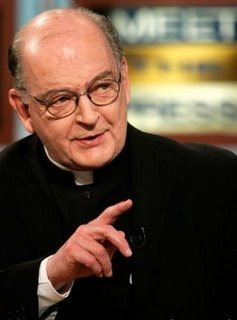 |
John Brug is a nice guy and very bright,
but no theologian. |
AC V has left
a new comment on your post "
Preuss,
Hero of UOJ, Roman Catholic - We Are Justi...":
Ringing endorsement
by John F. Brug in the Winter 2012 issue of
Wisconsin Lutheran Quarterly
(WELS) of a recent edition (Lutheran Legacy, 2011) of
The Justification of
the Sinner Before God by Eduard Preuss:
"This is one of the happiest
and saddest books in the history of Lutheran dogmatics. Walther called it the
best book on justification written in the 19th century. Very shortly after its
publication in 1868 the author defected to the Roman Catholic
Church...
"The book is an excellent exposition of all aspects of the
doctrine of justification...
"This edition is highly recommended."
***
GJ - OK, Ichabodians. Please stop laughing about the irony of this.
I could provide a long list of "conservative" Lutherans who would never quote me, admit to reading anything I wrote, or link Ichabod. Although most of them advocate universal absolution, they cannot forgive me for poking holes in their self-contradictory philosophy, which fueled the first homosexual Lutheran seminary in America - Seminex - chaired by UOJ guru Richard Jungkuntz.
But, no UOJ specialist stops to ponder the hilarity of promoting and reprinting a book written by man so unbalanced in doctrine that he became a Roman Catholic immediately after publishing this wretched bit of Enthusiasm -
The Justification of the Sinner Before God. Preuss had a spiritual crisis after he wrote this book, and no wonder. Look at the baloney he wrote, quoted below. My theory is that Lutheran clergy are turning to Enthusiasts of Fuller or Rome to settle their uneasy minds. Both brands offer the solution of the Law.
Quoted by Cascione:
CONCORDIA THEOLOGICAL SEMINARY
NEWSLETTER – Spring 1981
6600 North Clinton
Fort Wayne, Indiana 46825
THE PRESIDENT’S MESSAGE – "OBJECTIVE JUSTIFICATION"
The doctrine of objective justification is a lovely teaching drawn from Scripture which tells us that God who has loved us so much that He gave His only to be our Savior has for the sake of Christ’s substitutionary atonement declared the entire world of sinners for whom Christ died to be righteous (Romans 5:17-19).
Objective justification which is God’s verdict of acquittal over the whole world is not identical with the atonement, it is not another way of expressing the fact that Christ has redeemed the world. Rather it is based upon the substitutionary work of Christ, or better, it is a part of the atonement itself. It is God’s response to all that Christ died to save us, God’s verdict that Christ’s work is finished, that He has been indeed reconciled, propitiated; His anger has been stilled and He is at peace with the world, and therefore He has declared the entire world in Christ to be righteous.
THE SCRIPTURAL SUPPORT
According to all of Scripture Christ made a full atonement for the sins of all mankind. Atonement (at-one-ment) means reconciliation. If God was not reconciled by the saving work of Christ, if His wrath against sin was not appeased by Christ'’ sacrifice, if God did not respond to the perfect obedience and suffering and death of His Son for the sins of the world by forgiveness, by declaring the sinful world to be righteous in Christ -–if all this were not so, if something remains to be done by us or through us or in us, then there is no finished atonement. But Christ said, "It is finished." And God raised Him from the dead and justified Him, pronounced Him, the sin bearer, righteous (I Timothy 3:16) and thus in Him pronounced the entire world of sinners righteous (Romans 4:25).
All this is put beautifully by an old Lutheran theologian of our church, "We are redeemed from the guilt of sin; the wrath of God is appeased; all creation is again under the bright rays of mercy, as in the beginning; yea, in Christ we were justified before we were even born. For do not the Scriptures say: ‘God was in Christ reconciling the world unto Himself, not imputing their trespasses unto them?'’ This is not the justification which we receive by faith...That is the great absolution which took place in the resurrection of Christ. It was the Father, for our sake, who condemned His dear Son as the greatest of all sinners causing Him to suffer the greatest punishment of the transgressors, even so did He publicly absolve Him from the sins of the world when He raised Him up from the dead." (Edward Preuss, "The Justification of a Sinner Before God," pp. 14-15)












